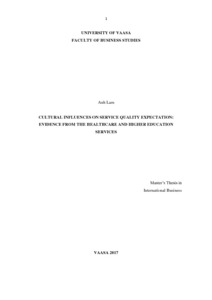CULTURAL INFLUENCES ON SERVICE QUALITY EXPECTATION: EVIDENCE FROM THE HEALTHCARE AND HIGHER EDUCATION SERVICES
Lam, Anh (2017)
Kuvaus
Opinnäytetyö kokotekstinä PDF-muodossa.
Tiivistelmä
This research is aimed to examine the influences of culture on service quality expectation with the focus on two service contexts of healthcare and higher education. Through contrasting these two contexts, it can be realized how different the cultural influence on service quality is in various types of services.
Culture and service quality expectation are measured in this research by applying the scales from previous literature. Specifically, the research apply Hofstede’s cultural dimensions as the cultural framework and SERVQUAL dimensions for the service quality expectation measurement. Hypotheses on possible correlation between culture and service quality expectations in healthcare and higher education are determined and tested. This thesis applies mainly quantitative method with the support from qualitative method in order to help explain the finding from quantitative analysis. In term of quantitative method, the thesis’s sample covers 402 objects whereas there are 7 people interviewed for the qualitative method.
In the higher education context, Masculinity is the only cultural dimension found to be positively correlated with all service quality dimensions. In the healthcare context, Uncertainty Avoidance is found to be positively correlated with all service quality dimensions whereas Indulgence, Long-term orientation and Power Distance are only correlated with some dimensions of service quality. It means that cultural influences vary among service types.
The research findings indicate that culture profile of customers should be put into consideration for allocating resources effectively in service performance and delivery.
Culture and service quality expectation are measured in this research by applying the scales from previous literature. Specifically, the research apply Hofstede’s cultural dimensions as the cultural framework and SERVQUAL dimensions for the service quality expectation measurement. Hypotheses on possible correlation between culture and service quality expectations in healthcare and higher education are determined and tested. This thesis applies mainly quantitative method with the support from qualitative method in order to help explain the finding from quantitative analysis. In term of quantitative method, the thesis’s sample covers 402 objects whereas there are 7 people interviewed for the qualitative method.
In the higher education context, Masculinity is the only cultural dimension found to be positively correlated with all service quality dimensions. In the healthcare context, Uncertainty Avoidance is found to be positively correlated with all service quality dimensions whereas Indulgence, Long-term orientation and Power Distance are only correlated with some dimensions of service quality. It means that cultural influences vary among service types.
The research findings indicate that culture profile of customers should be put into consideration for allocating resources effectively in service performance and delivery.
